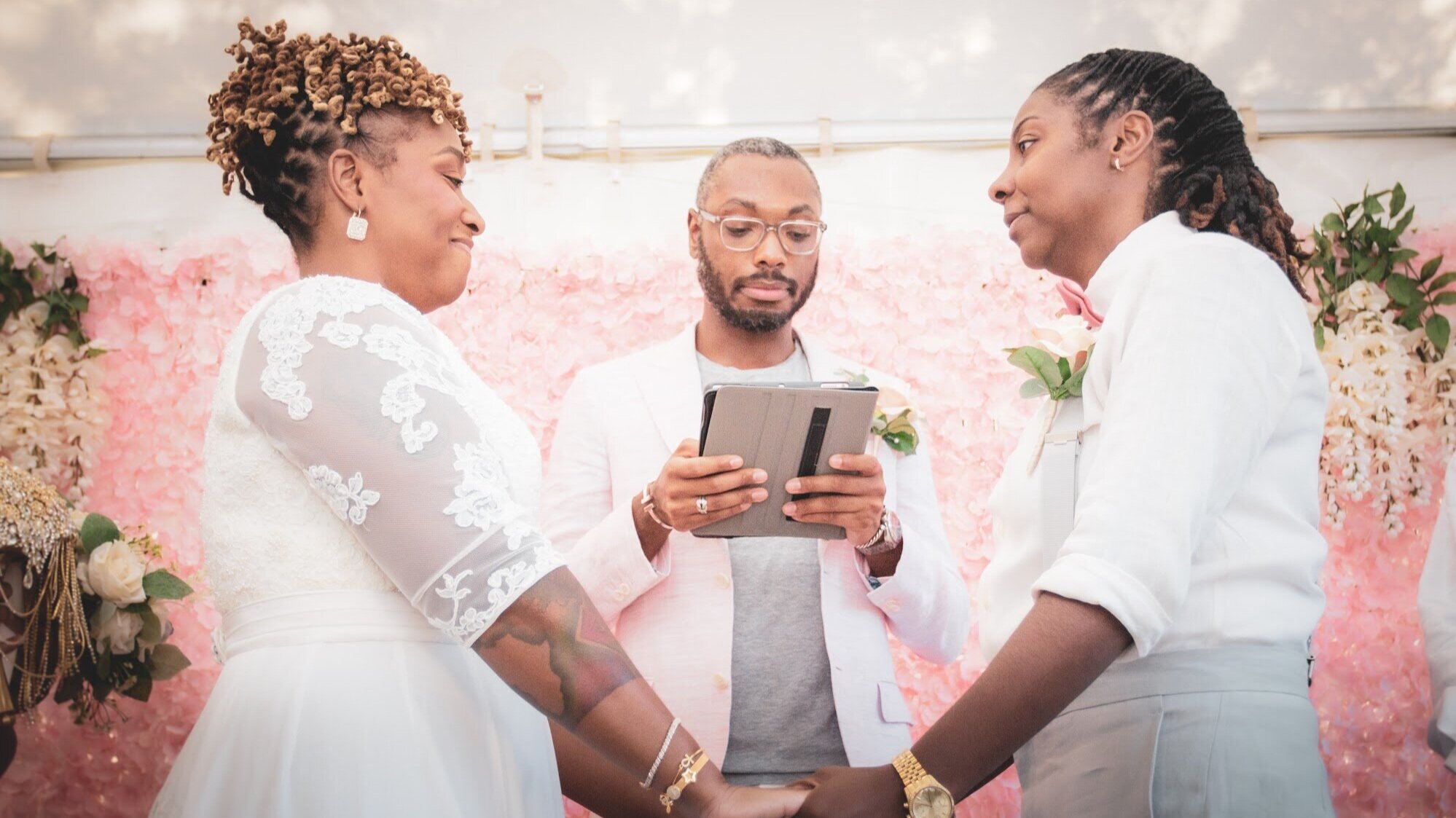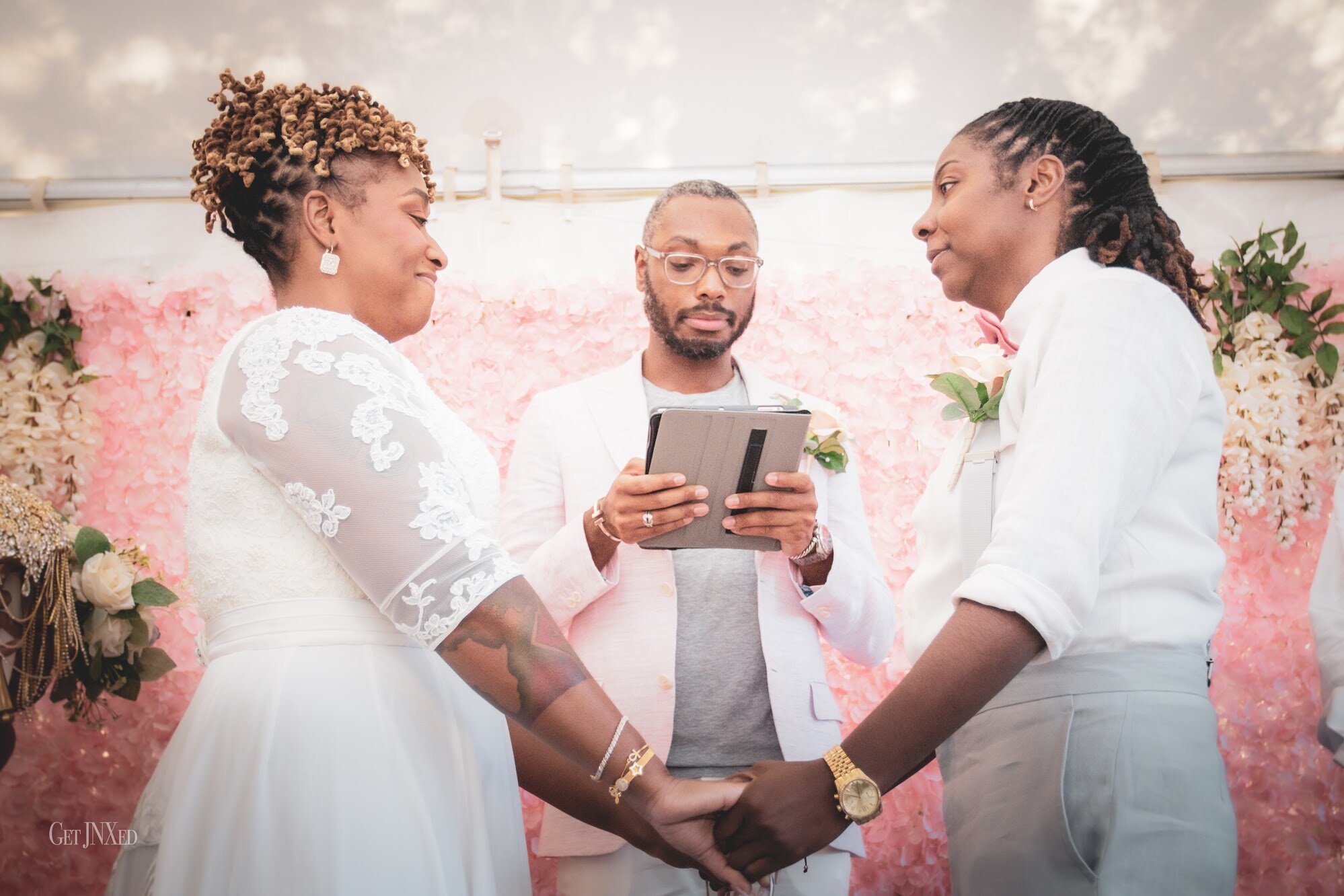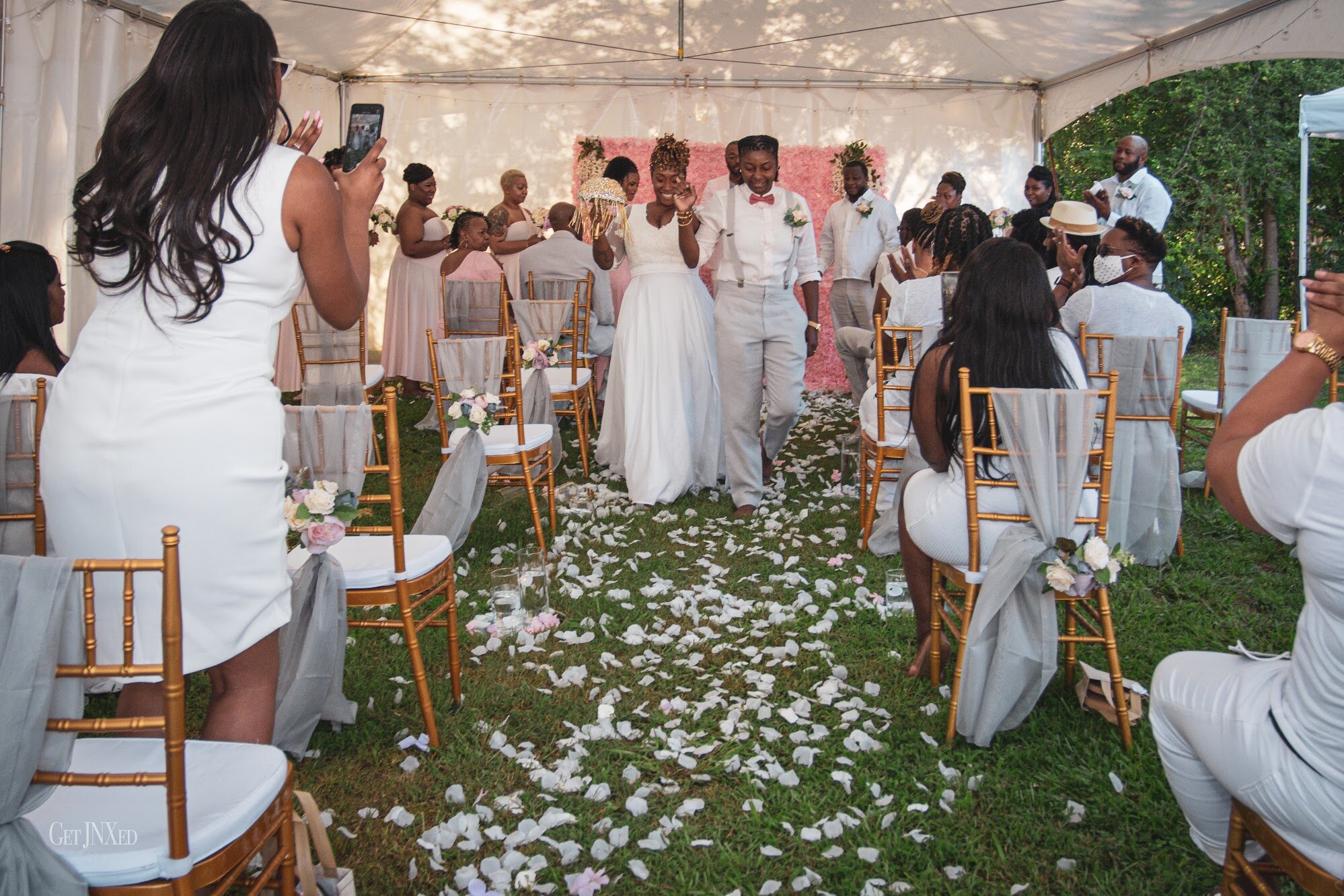‘Black Women Are Marrying—We’re Marrying Each Other:’ Lesbian Marriage Grows as Black Women Defy Marriage Trends

Britney Lee (Left) and Veronica Lee (Right) - Image courtesy of subject (Photographer: Jaz’Reale Jinks)
Growing up in the progressive Washington D.C. area, lesbian-identified Britney Lee never gave a thought to whether she’d be able to marry when the time was right. The right time arrived in 2020, five years after a chance meeting of a fellow soror with whom she shared a near-instant bond. The pair married last July, in an intimate ceremony in their East Point backyard, becoming one in a wave of Black lesbians increasingly saying “I do.”
A decade after scholars declared marriage among American Black women dying, a growing segment of Black lesbian women is putting a dent in that trend. They cite everything from increased societal acceptance to growing family recognition and even social media for encouraging them to challenge data that suggest Black women aren’t marriage material.
“We’re so focused on the heterosexual piece but Black women are marrying,” says associate professor Siobhan Brooks, who studies Black LGBTQ+ issues at California State University, in Fullerton. “We’re marrying each other.”
The history of Black American women and marriage is a complex one: Experts have blamed slavery-era family splintering, lower educational attainment in romantic partners, and even welfare policies for marriage numbers that have long lagged behind those of White women.
The topic captured national attention in 2010, when Census numbers showed 41 percent of Black women had never been married, compared to 21 percent of White adult women. Since then, the Black marriage gap has been a continued topic of community interest, spawning countless articles, studies, and even films.
“I think overall people are just more comfortable to live in their truth. Society is really making it possible.”
But the numbers ignore the realities of the Black LGBTQ+ community.
The Census counted 568,110 married same-sex households in 2019, the most recent year for which data is available. Those numbers included 25,790 married Black lesbians – up from 17,439 in 2015.
Increased public profile
As societal norms shift, more Black lesbians are becoming comfortable with not only forming relationships but formalizing them and celebrating them with the same high-profile rituals as their straight counterparts, says Atlanta-based Tynisha Lovett, whose Bride Navy Instagram page has drawn more than 26,000 followers since 2019. The page is one of several that have sprung up on the photo-sharing network that targets Black lesbian brides-to-be with merchandise, wedding pictures, and even over-the-top engagement videos.
“You’re seeing the proposals and it’s becoming a normal thing,” Lovett says. “All of my friends are married or engaged.”
On Facebook and YouTube, meanwhile, accounts like Inside the Life of M and M, run by a Black lesbian couple here in Atlanta, have drawn over 7,000 subscribers to watch videos documenting their journey from dating to married moms-to-be.
“Gay marriage gives you the language that heterosexual people have had all along – ‘This is my spouse, this is not my friend, this is not my cousin.’ That’s really important because what it does is it gives Black lesbians visibility in a lot of our communities in a way that we haven’t had it before.”
That increased public profile has helped empower many Black lesbian couples to take the next step, says Crystal Payne, who offers wedding officiating and pre-marital counseling to LGBTQ+ couples across metro-Atlanta.
“These couples are kind of letting us into their lives,“ says Payne, adding she is seeing many more female couples seeking pre-marital counseling, even before they’re engaged. “That’s very inspirational to a lot of people who are looking and wondering if this is something that I can have one day.”
Payne says normalizing their lives and re-creating the family units they grew up with also are powerful motivators among the couples she counsels.
“We want to be like our neighbors next door,” she says. “We’re wanting to be able to express love the same ways we see our families express love.”
Understanding the cultural motivations and benefits behind marriage between Black women was the topic of Siobhan Brooks’ 2017 study, “Black on Black Love: Black Lesbian and Bisexual Women, Marriage, and Symbolic Meaning.” In it, Brooks discovered that while White LGBTQ+ couples often saw their marriages through the lens of broad social equality, Black lesbians more often viewed marriage as a route to improved community standing.
“It makes it on a level playing field just like someone else and their spouse,” she tells The Reckoning. “It legitimizes their relationship in spaces where their relationships are not seen as real.”
Women told her that being able to refer to their partner as their wife, for example, made everyone from uncles and aunts to co-workers acknowledge their partnerships, Brooks says.
“Gay marriage gives you the language that heterosexual people have had all along – ‘This is my spouse, this is not my friend, this is not my cousin’,” she says. “That’s really important because what it does is it gives Black lesbians visibility in a lot of our communities in a way that we haven’t had it before.”
The wedding of Britney and Veronica Lee - Image courtesy of subject (Photographer: Jaz’Reale Jinks)
For Britney Lee, marriage to partner Veronica Lee had an immediate effect in her family.
“I gained a lot of respect once it was clear we’re getting married,” she tells The Reckoning. “I could have taken someone to a family gathering years ago and nobody uttered two words to them, whereas now they’re like ‘Hi, I’m Britney’s aunt’.”
Yet the increase in wedding bells for Black lesbians doesn’t come without a downside. In particular among lesbians, often stereotyped as fast-tracking their relationships, some worry that more women are jumping into a legally binding union without thinking long term.
“I have seen a lot of lesbian relationships where they’re not together even six months and they’re like, we’re going to the courthouse to get married,” Britney says. “Then the next six months, they’re getting a divorce. They haven’t taken the time to know what everybody brings to the equation.”
The Lees dated for five years before Veronica surprised Britney with a ring during a trip. Since then, they’ve settled into a cozy life in East Point, both working as educators in the Atlanta area. And as for why they figure so many women like them are heading to the chapel?
“I think overall people are just more comfortable to live in their truth,” Veronica says. “Society is really making it possible.”
Dionne Walker-Bing is an Atlanta-based reporter with over a decade of experience. Walker offers a distinct voice and unique skill for capturing the stories of diverse communities, perfected while writing for The Associated Press, The Capital-Gazette (Annapolis), and a variety of other daily publications throughout the Southeast. When she’s not writing features, Walker is busy traveling, crafting, or perfecting her vinyasa yoga skills.


